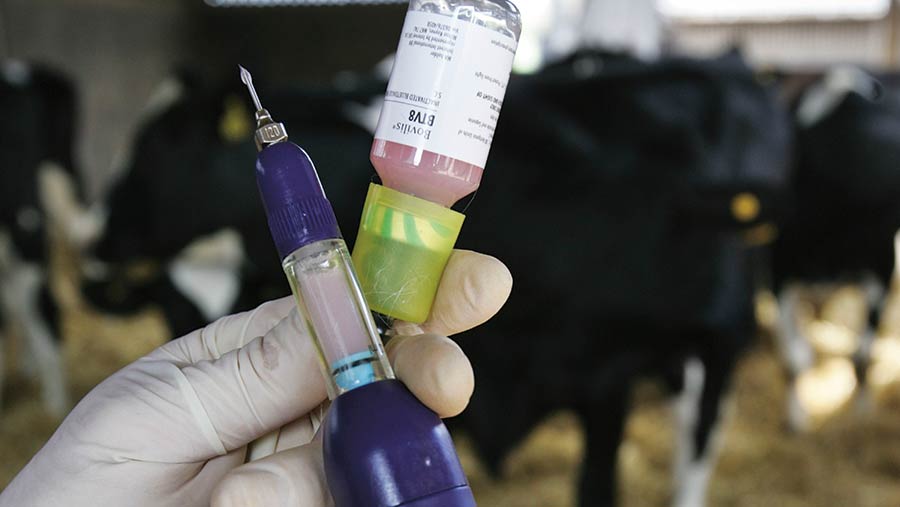Advice on bluetongue risk and vaccination
 © Tim Scrivener
© Tim Scrivener Bluetongue is a viral disease of both sheep and cattle, with sheep being the most severely affected.
The virus is spread by biting midges, so the risk rises when it is warm, particularly in the summer and autumn in Europe.
The disease has a significant effect on production as there is a high mortality rate among infected animals, and those that survive the virus, will lose condition with a reduction in meat and wool production.
Symptoms include:
- Mouth ulcers
- Mucus discharge
- Swelling of the head and neck
- Red skin
- Lameness
See the NADIS website for detailed information on bluetongue in cattle and sheep.
Vets stress that vaccination should be seriously considered by UK farmers to protect their animals from the virus.
With vaccinations now available, we spoke to independent vet Andy Adler, director of Synergy Farm Health, to find out which farm and stock is most at risk and when vaccinations should be carried out.
See also: Bluetongue vaccines available for cattle and sheep
1. How should farmers assess the risk level on their farm?
Assessing risk is difficult. It really is up to farmers to decide what level of risk they are prepared to accept.
What we do know is that sheep are more at risk of clinical signs than cattle and the government has estimated an 80% risk of bluetongue coming to the UK from France at the end of the summer. The vaccine is the only way to prevent the illness.
Additionally, if the disease comes to the UK there will be a significant no-movement zone created and only vaccinated animals will be able to be moved from the zone.
Southern counties in the UK, particularly Devon, Somerset, Dorset and Hampshire, are at high risk geographically as they are the closest to northern France, where the disease is expected to spread from.
There is no official vaccine programme, so farmers need to speak with their vets to make an informed decision based on their own situation.
2. How should vaccination be carried out effectively and when does immunity kick in?
The vaccine is straightforward and consists of two injections given four weeks apart. Immunity is provided 25 days after the second injection.
3. Which animals should be vaccinated against the virus?
Animals thought to be most at risk of the disease should be vaccinated – this would naturally be sheep and those that are pregnant.
However, all animals are at some risk, although the clinical signs and economic loss might not be as severe in other situations.
Farmers need to be aware of the economic cost of not being able to move infected cattle out of the no-movement zone and this may also be an indication for vaccination.
4. When should animals be vaccinated?
Obviously animals should be vaccinated before the onset of clinical signs of the disease. Farmers concerned about the risk of an outbreak in their livestock should begin vaccinating as soon as possible.
Those who are prepared to wait and see if the disease reaches the UK need to bear in mind that the vaccine takes nearly two months to become effective.
Farmers should also consider that there will only be a limited number of doses of the vaccine available in the UK. If bluetongue does spread from France to the UK, that supply will be taken up very quickly.
5. How long will the vaccination last and should it be done more than once?
The vaccination gives protection for one year. Once we know the spread of the disease this year, vets will be able to advise on animals that have been vaccinated this year and whether they will need to have a booster next year.
6. Are there any dangers associated with vaccination, such as increased abortion risk or other side effects?
There are no reported contra-indications for this vaccine and it is safe to use in pregnancy.
As with all vaccines, it should only be used on healthy animals and handling stress should be kept to a minimum.
7. What does the vaccine cost?
The cost of the vaccine will vary throughout the country and farmers should speak to their local vets. The vaccine is only available in batches of 50 doses, so buying for small numbers of livestock will be more expensive.
8. Should farmers speak to their vet about the vaccination? And must vets administer the vaccine or can farmers do it themselves?
The vaccine is a prescription-only medication and therefore farmers must always speak to their vets first. However, farmers are able to administer the vaccine themselves.
Best-practice vaccination advice
- Always read the label and give a full vaccination program as detailed.
- Check route of administration each time to make sure you are delivering the vaccine appropriately.
- Vaccines work best in healthy animals. Avoid those that are suffering from disease or are nutritionally stressed.
- Beware that using vaccines 14 days prior to calving/ lambing will decrease efficacy.
- Always keep a record of animals vaccinated, batch number and expiry date, and any withdrawal.
- Handel animals with care to minimise stress when vaccinating.
- Any suspected adverse reactions should be reported to your prescribing vet.
- The person injecting should consider going on a safe use of vet medicines course to make sure their knowledge is up to date.
